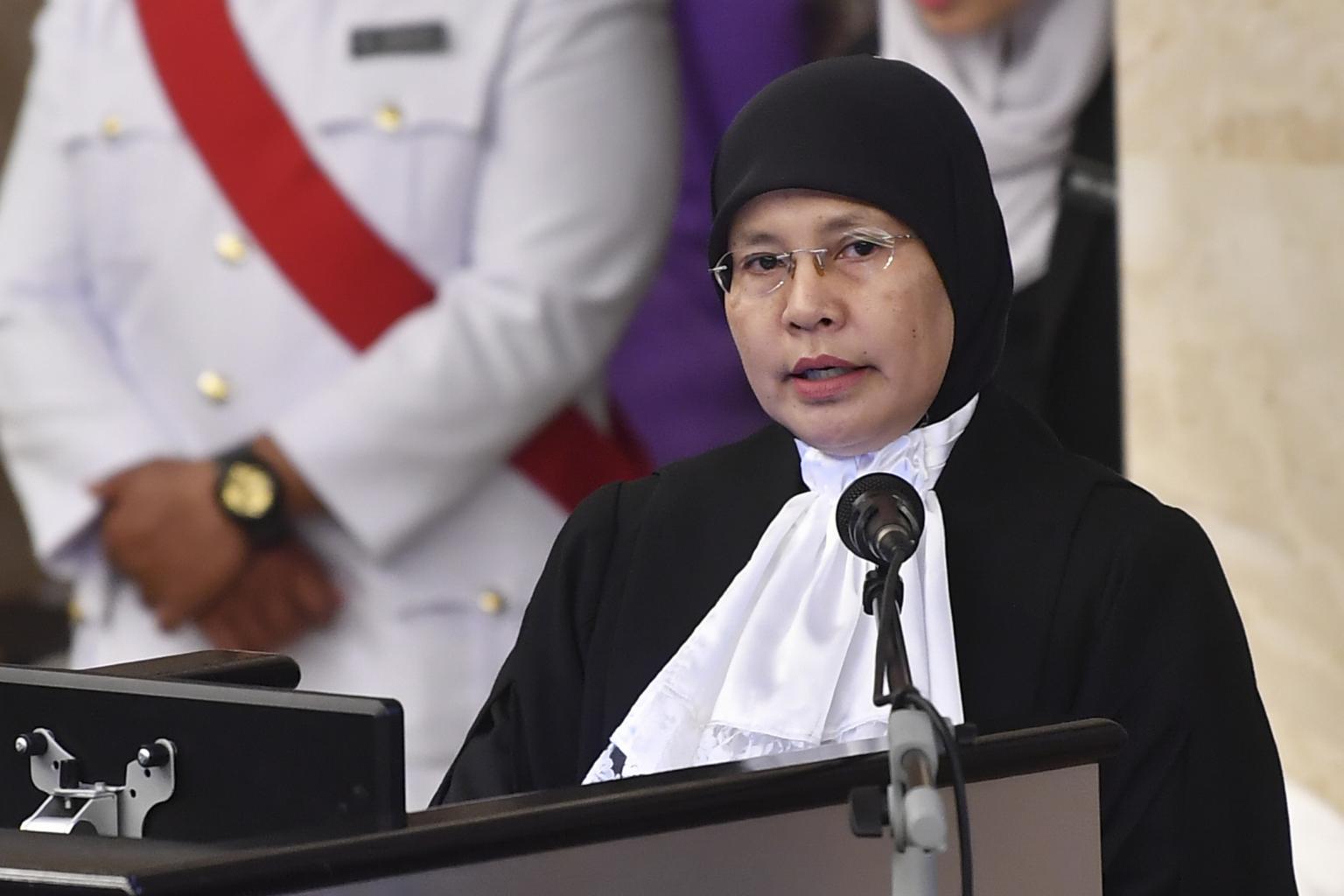Decisions by Malaysia's Chief Justice draw attention in landmark case of ex-PM Najib
Sign up now: Get insights on the biggest stories in Malaysia

Malaysia's Chief Justice Tengku Maimun Tuan Mat speaks at the Oath of Office and Allegiance Ceremony for the Chief Justice of Sabah and Sarawak at the Judicial Palace on Feb 25, 2020.
PHOTO: BERNAMA
Follow topic:
PETALING JAYA (THE STAR/ASIA NEWS NETWORK) - Tun Tengku Maimun Tuan Mat, the Chief Justice of Malaysia, has always stayed out of the glare of publicity and stuck to the decorum expected of her high position.
The only time she was in the news was when she made decisions on law.
But now, she has been thrust into the centre of attention as she presided in the last one week over the final appeal of ex-prime minister Najib Razak at Malaysia's apex court, the Federal Court.
She decisively cut through several legal moves by Najib's lawyers in what could be seen as tactics to adjourn the court.
On Tuesday (Aug 23), the five-member bench led by her affirmed Najib's 12-year jail sentence for misappropriating millions of dollars from a company linked to state fund 1Malaysia Development Berhad (1MDB), thus becoming the country's first ex-prime minister to be jailed.
The recent decisions and speeches by Tengku Maimum, 63, have led to many people talking about her and the bench she leads.
Malaysia's 16th top judge has already created history by becoming the first female Chief Justice, and the records show she was appointed for her abilities and qualification.
Amid attacks alleging misappropriations against a High Court judge who had first convicted Najib, Tengku Maimun said in April: "Citizens including politicians are, to a certain extent, free to criticise the judiciary.
"However, that does not mean that it is open to citizens, including politicians, to level unfounded and scurrilous attacks against the judiciary or a particular judge to further their own end."
She received a standing ovation at that ceremony to swear in High Court judges.
Tengku Maimun hails from Kelantan.
She graduated from Universiti Malaya in 1982. She began her career as a legal officer at the Southern Kelantan Development Board, or Kesedar.
She later joined the judicial and legal service where she served in various capacities for over 20 years.
She was appointed as Judicial Commissioner in 2006 and rose through the ranks as a High Court, Court of Appeal and Federal Court judge, from 2007 until 2019.
On May 2, 2019, she reached the pinnacle of her career when she was appointed as the 10th Chief Justice.
She is known for several notable judgments that became landmark decisions in Malaysia's judiciary.
In 2019, Tengku Maimun was the only judge who gave a dissenting judgment, where she upheld and favoured setting aside charges against the late Karpal Singh.
Mr Karpal, a prominent opposition politician and lawyer, had been charged under the Sedition Act over a press statement and was acquitted in 2019.
Tengku Maimun will also be remembered as the Court of Appeal judge who in 2018 reversed a High Court ruling, by allowing a Buddhist father to get sole guardianship of his children who had been unilaterally converted to Islam by their mother.
The High Court had previously allowed the mother to have custody of the two children. The mother had converted to Islam and changed the children's faith without the father's permission.
Another big decision which involved Tengku Maimun was when the Court of Appeal decided that Muslim children, who were deemed born out of wedlock, should be allowed to carry their father's name in their birth certificates.
The court ruled that the National Registration Department was not bound by any fatwa, or religious edicts, when it came to deciding the surname of the child.
The Malaysian Bar has reportedly described her as "a person known for her sound decisions, impeccable judicial temperament and, most of all, her independence".
In a speech which Tengku Maimun made in 2021 at the Australia Indonesia Partnership for Justice webinar, she said the task of a judge was onerous and it was reflected in the oath that judges took, "namely to bear true faith and allegiance to Malaysia and to preserve, protect and defend the Constitution."
She added that the "Malaysian community hoped that I would restore the judiciary to its past glory and that I will put in place righteous judges to adjudicate cases at hand''.
Tengku Maimun also said that "significantly, justice is represented by a lady carrying a sword and scales, nearly always blindfolded to symbolise the fair and equal administration of law, without bias or prejudice, fear, or favour.
"It is thus most befitting to have female judges administering and dispensing justice."

